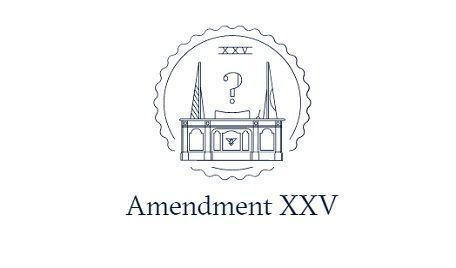Since his election, President Donald Trump has faced increasing calls to remove him from office, on both sides of the political spectrum. And while there are several methods of removal detailed in the US Constitution, one that has received a renewed amount of interest is not "impeachment", but the rarely cited 25th Amendment. So what exactly does this method entail, and how likely is it to be used against Donald Trump?
自當(dāng)選以來,唐納德·特朗普總統(tǒng)在兩黨間都面臨著越來越多要求他下臺(tái)的呼聲。盡管美國憲法中詳細(xì)列出了幾種罷免總統(tǒng)的方法,但人們重新關(guān)注的一種方法不是“彈劾”,而是很少被引用的第二十五條修正案。那么,這種方法到底意味著什么,它被用來對付唐納德·特朗普的可能性有多大?
Well, the 25th Amendment was actually envisioned not as a method of removing the President from power, but instead a clarification of what would happen if the President was incapacitated, resigned, or died. According to Article Two of the Constitution, in any of these cases, the Vice President would take over, and Congress would be allowed to select another official to govern until the President could resume their duties, or a new President be elected.
第二十五條修正案實(shí)際上并不是一種解除總統(tǒng)職務(wù)的方法,而是說明:如果總統(tǒng)喪失行為能力、辭職或死亡會(huì)發(fā)生什么。根據(jù)憲法第二條,在任何這些情況下,副總統(tǒng)都將接任,國會(huì)將被允許選擇另一名官員任職,直至總統(tǒng)能夠恢復(fù)職務(wù),或選出一位新總統(tǒng)。

That might sound straightforward, but it actually created a series of problems concerning succession of the Presidency. When the VP takes over, does that mean they are now officially the next President, or are they simply acting President until the next one is elected? And who becomes Vice President?
這可能聽起來很簡單,但實(shí)際上卻造成了一系列關(guān)于總統(tǒng)繼任的問題。當(dāng)副總統(tǒng)上任后,這是否意味著他現(xiàn)在正式成為下一任總統(tǒng),還是只是在下屆總統(tǒng)當(dāng)選之前任代理總統(tǒng)?以及由誰來擔(dān)任副總統(tǒng)職位?
One example of this ambiguity was after the assassination of Abraham Lincoln. When Vice President Andrew Johnson took over he didn't name a new Vice President. Three years later, he was impeached. Had the Senate voted to remove him from office, which they did not, there would have been no second in command to take over the Presidency.
這種模棱兩可的一個(gè)例子就是亞伯拉罕·林肯遇刺后面臨的情形。副總統(tǒng)安德魯·約翰遜上任后,他沒有任命新的副總統(tǒng)。三年后,他被彈劾。如果參議院投票讓他下臺(tái)(他們沒有這么做),那么就不會(huì)有第二個(gè)掌舵人接替總統(tǒng)職位。
Clearly, this question of succession had to be dealt with, and that's where the 25th Amendment came in. It delineated four sections. The first clarified that yes, the Vice President becomes the actual President if the former president is removed, dies, or resigns. The second states that when there is a vacancy in the Vice President position, the President nominates a replacement, who must be approved by a majority of Congress. The third standardizes what happens if the President becomes incapacitated, and has to temporarily grant power to the Vice President, which has most commonly been used for medical reasons.
顯然,權(quán)力繼承的問題必須得到解決,這也是第二十五條修正案的作用所在。它包括四個(gè)部分。第一點(diǎn),澄清前述問題,是的,如果前總統(tǒng)被免職、死亡或辭職,副總統(tǒng)將正式成為總統(tǒng)。第二點(diǎn)指出,當(dāng)副總統(tǒng)職位出現(xiàn)空缺時(shí),總統(tǒng)提名一位接替者,而他必須得到國會(huì)多數(shù)議員的批準(zhǔn)。第三點(diǎn)規(guī)定,如果總統(tǒng)失去行為能力,必須暫時(shí)將權(quán)力授予副總統(tǒng),而這一情形出現(xiàn)的最常見原因是醫(yī)療原因。












